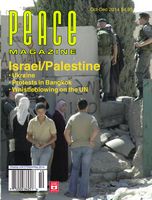
Peace Magazine Oct-Dec 2014, page 29. Some rights reserved.
Search for other articles by Peter Nicholls here
By Christopher Coker. Polity Press, 2014, $13.95.
Twelve years ago Philip Bobbitt published his massive book, The Shield of Achilles, which posited a central and sometimes creative social role for war (reviewed by P. Nicholls, Peace Magazine Vol.18, No.4, p.30). Now Polity Press are publishing a series of works titled “Global Futures,” and one item on their list is this little book by Christopher Coker. It may be more accessible than the Bobbitt work. And Coker perhaps sees war as less creative than Bobbitt.
The major starting question addressed by both authors is whether war is “pathological” (Rousseau) or “normal” (Kant). In the former case pacifism is the only rational position, but in the latter we can still construct a balance sheet and evaluate the institution of war as a net “negative” while rejecting the pathological label. Coker, like Bobbitt, believes that war is not pathological but embedded in our cultural evolution. He tries to place it in an evolutionary context, with some emphasis on possible group selection (still a controversial idea in biology) as a driver for conflict. He argues against any supposed peaceability of primitive societies, adopting a rather Hobbesian view of humanity. Although individuals may value peace and efforts to achieve it, there is little social impetus for fundamental change. Warriors are still seen as enhancing social life. Like slavery, whose formal legal abolition is seen by some as an example of humane and progressive social change, the evil persists none the less in a different garb.
The abolition of war may therefore demand more than UN decision-making; it may require either or both new thinking (Hegel, Freud) or moral improvement (Kant). The nature of war changes but change does not end it. Technology has more than once been thought to make war impossible—the Maxim gun in the 19th century and nuclear weapons in the 20th— but such weapons are recruited into the armory and the hope that war may become impossible remains unrealized. Indeed, Coker believes that nuclear weapons will never be completely banned. The major technological effects have been a decline in need for strength, greater specialization, and often the remoteness of the warrior from the battle field.
“Geopolitical” analysis always includes war as a possibility. Coker discusses whether its geopolitical status in 1914 weakened liberal thinking in Germany. He uses Bobbitt’s idea that the nation-state is giving way to the market-state and consequent partial privatization of war and a declining need for patriotism. But some states are not yet market-states and contribute to a fragmented international order. He notes the continuing nuclear weapons taboo. Is this linked to the continuing absence of great power war? Geopolitically, peace and war persist as two sides of the same coin.
Kant predicted the need for a “federation of free states” (remarkably prescient of the UN) but in addition thought that human nature had to change, to approach moral maturity. Yet not all believe in the aggressively secular Western democratic model. “Peace” also has multiple meanings, as pointed out by Susan Sontag. Is it: Absence of war? Forgetting? Forgiveness? Or victory! Note the historic peace enforced by power (Pax Britannica). Can peace therefore come without freedom? Can it only come without freedom? Some of us remember the USA in the 1960s and the feeling then that peace without justice was not worthwhile. We can consequently regress. Note the anomaly of the 1990 Balkan wars (in a previously “embedded peaceful Europe”).
Coker does not come to a final conclusion as to a more peaceful future. To “pathologize” war is to pathologize the human condition. But we are also not murderous. He is aware of the numerous recent peace books and commends especially J. Horgan’s class=“italic”>The End of War_ (2012). He provides an extensive and important terminal bibliography. His cited authors vary, sometimes within their own writing. Thus Steven Pinker, recently optimistic (The Better Angels of Our Nature: A History of Violence and Humanity), was earlier more pessimistic (The Blank Slate: The Modern Denial of Human Nature).
While far from pacifism, this book is a useful summary of what to consider in the struggle to abolish war. It can be read in an evening. Almost every page contains both a thought to agree with and then one to oppose. It’s realistic. The reader must supply the optimism. The challenge is worthwhile.
Reviewed by Peter Nicholls (1935-2014)

Peace Magazine Oct-Dec 2014, page 29. Some rights reserved.
Search for other articles by Peter Nicholls here